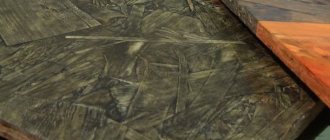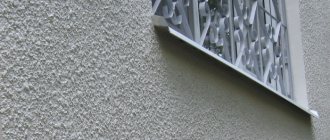In recent years, foam products have begun to be used in all spheres of human life. Most often they are used in construction, and not only as insulation. For example, decorative elements in the form of ceiling skirting boards and tiles made from this material are popular. Since polystyrene foam is produced exclusively in white, many buyers think that it is not suitable for decorating their interior. Luckily, there are ways to paint foam board and give it a look that matches the overall decor of the room.
Painted polystyrene foam is an excellent solution for room decor
What criteria must paint for foam plastic meet?
Polystyrene foam can be used in different conditions; accordingly, the coloring agent must be selected individually. But, as far as properties are concerned, these are:
- easy application on any foam surface (ball, square, flat structures);
- strength, density and conditional elasticity (the layer should not fall into the pores of expanded polystyrene);
- resistance to weather conditions and household chemicals (ingress of detergents, precipitation, etc.).
It is not advisable to paint all ready-made foam products: laminated panels (like kitchen splashbacks) do not need this procedure.
Gold painting of foam ceiling tiles using a kitchen sponge Source kraski-net.ru
Positive qualities of paints
Any coating proposed in the article has its own properties and advantages. Let's consider them using the example of paint based on water emulsion:
- environmentally friendly (as it is odorless and does not emit toxic gases and vapors);
- easily and accurately covers the desired surface;
- a wide range of pigments (bright, pastel, you can always choose);
- attractive price (up to 1,500 rubles per bucket, varies depending on the manufacturer’s brand).
Foam crafts can be painted with gouache, provided that they do not come into contact with moisture Source kaksdelat.su
If you are not yet sure how to paint polystyrene foam, we suggest studying the advantages of acrylic compositions:
- has no smell;
- dries quickly even without drying:
- resistance to temperature and temperature changes;
- ease of application;
- long service life;
- health safety;
- resistance to ultraviolet rays and dirt;
- elementary care.
However, this product is expensive, but it is applied the first time, so you won’t have to renew the coating for a long time, as is usually the case with cheap analogues.
On a note! Be careful when applying paints. If you soak your brush in too much paint, it will begin to peel off as it dries.
Advantages of painted material
During operation, products made from foam plastic gradually lose their original appearance, therefore, using coloring, it can be improved.
Before you begin, you need to make sure that the chosen paint for foam plastic will not only damage the material, but will also provide some advantages:
- protects against negative environmental influences (dirt, moisture, stains);
- will add freshness to a product that has yellowed over time;
- will facilitate further care;
- makes it easy to clean;
- fits well into the existing design;
- will give a complete look to the room.
Choosing paint for foam plastic in different conditions
Since polystyrene foam is a universal material, it is used in various fields. Accordingly, you need to choose the type of coloring agent for it, taking into account the operating conditions.
Small parts made of foam plastic should be painted with a thin polar brush or use stationery brushes Source kirpich-sbm.ru
Algorithm for painting different foam surfaces
Having familiarized yourself with the compositions of how to paint polystyrene foam, you can begin the procedure. All work on painting foam surfaces must be carried out in strict sequence.
The ceiling molding needs to be painted, having previously sealed the joints with mounting tape Source build-experts.ru
- At the initial stage, level the surface. To do this, hide the seams using putty or a special adhesive. It is also necessary to smooth out the places where the dowel heads stick out (if this is a façade covering). In addition to solutions, reinforcing tape can come to the rescue.
- Do not start painting until you have removed dust, dirt, cobwebs and excess roughness from the foam. When painting foam plastic, they will roll off and spoil the appearance. This will result in dirty spots, pellets and other defects.
- Perform priming. To do this, use a special acrylic-based composition. During the process, the primer may roll off, so smudges cannot be avoided. This is not a problem, since after the product has completely dried, all protruding elements can be carefully removed with a spatula.
- Putty the foam surface after applying the primer. This will make it possible to maintain the strength of the coating when in contact with aggressive paintwork materials. For putty, use a rubber spatula, trying not to leave indentations or scratches (although they can be removed later by sanding). The entire surface does not need to be puttied if water-dispersed paints are used. It is enough just to hide the joints.
- Carry out painting according to the intended scheme, use a roller. With its help, any type of paint will apply smoothly and neatly. Don't forget to have a small brush. It will help paint over small, hard-to-reach places (in corners, for example). Pour some paint into the tray and then dip the roller. Make sure it doesn't drip. When coating the surface, move strictly in one direction, otherwise streaks will appear.
What to do if you use spray paint
Let's look at how to paint polystyrene foam with spray paint. This pigment is the easiest to use. The procedure does not require special skills, but you need to act as carefully as possible. The sequence of work will be as follows.
- Shake the can. The paint for the foam plastic should be thoroughly mixed in it. It is enough to spend 2-3 minutes on this process.
- Select a distance of 30-35 cm and start spraying the paint evenly over the entire surface.
- Apply paintwork in two or three layers, just make sure the previous one is completely dry to avoid sticking together lumps and uneven coloring.
On a note! If you chose canned paint and the composition seemed too thick, you can dilute it with water. Just don't pour the liquid directly into the jar, otherwise the paint will ruin. Select a separate container for this and carefully dilute the composition, while stirring it until a homogeneous consistency is obtained.
Sequence of actions during operation
The dyeing process consists of several stages:
- Preparatory – includes preparing the room (if possible, remove furniture from the room, cover floors and windows with film), put on protective clothing and special glasses. Prepare the necessary tools (brushes of different sizes and rollers, stepladder, bucket or paint tray).
- Preparing the material for coating - the joints on the new tile are sealed, the old one is cleaned of dirt, the seams are renewed, and primed.
- Coloring - when using the composition in an aerosol package, preliminary shaking of the can is required. After this, they begin painting the surface from a distance of 25 cm. After waiting until the first layer has completely dried, they begin to apply the next one.
If the coloring composition is in a jar, it is applied with a roller or brush. When applying several tones, the composition is thoroughly mixed before coating to obtain a uniform color.
You can also paint the foam with watercolors.
Features of painting Hand-Made crafts
The most convenient option for painting polystyrene foam, which is the basis of crafts, is aerosol paints. Only as a base can the workpiece be coated with water-based emulsion. It will be a good start for painting.
Crafts made from pure white foam plastic can be painted with azure watercolor Source roomester.ru
Apply a layer of water-based emulsion to the product on all sides (using paint and watercolor brushes) and leave until completely dry. Next, you can apply a drawing and paint it with gouache along the intended contour. If, for example, you are making a New Year's toy, then you can additionally spray it with aerosol paint with glitter. At the same time, choose odorless synthetic materials.
Do I need to paint?
Today, painting of foam plastic is carried out for two reasons:
- Give strength to the material used.
One of the main reasons to use a foam cover is to protect it from deterioration. For example, if the material is used on the facade of a building as insulation, all stages of its coating must be correctly followed: from plaster to the application of coloring pigments. In this way, the apartment or house will become much warmer, that is, we will get the “thermos” effect. Professionals should be invited to perform such work. They know exactly what layer of adhesive mixture needs to be applied to the wall, how to cover the foam, what material can be used as insulation: penoplex or expanded polystyrene. All these, at first glance, little things will help preserve the material from precipitation, and simply from deformation of the foam.
- Achieve a general combination with the main interior design.
It is possible to create unique decorative elements for rooms using polystyrene foam or expanded polystyrene. But you are unlikely to like it if the overall style includes a white plinth with a bubble texture or a mirror frame in the same color scheme. This problem can be easily solved; you need to cover the material with a layer of paint. And if you want the color not to fade, to be bright and rich, coat the product with moisture-resistant varnish.
Next, let’s figure out how polystyrene foam differs from expanded polystyrene, and how to paint polystyrene foam? How to choose the right coloring material?
On video: the advantages and disadvantages of polystyrene foam.
Models of professional paints for foam plastic
There are plenty of coloring agents with suitable composition. We offer several interesting compounds that are completely harmless to polystyrene foam.
- Tikkurila luja. An ideal paint option with different characteristics. Differs in covering properties. This is the ability of paint to hide the shade that was originally presented on the surface of the foam. The lower this indicator, the more layers will have to be applied to hide the base.
- Parade W4 - foam paint is quite durable, adheres well to the foam and stays on its surface. Tikkurila Euro 7 is the best option for polystyrene foam. Suitable for decorating fillets, moldings, baguettes. Such paintwork materials are often used to decorate baguette designs or ceiling patterns on tiles.
- Acrylic glazers are necessary to create a decorative effect: aged stone, malachite, imitation wood coatings, marble, silver and other artificial coatings.
On a note! Before applying paint, use a primer regardless of what function the foam will serve: toy, facade, decoration. It is advisable to prime the coating in two layers.
In case extruded polystyrene foam needs painting, then an initial treatment with an adhesive primer should be performed.
Painting foam crafts with oil paints Source dekormyhome.ru
Briefly about the main thing
What paint to paint polystyrene foam is an important question, and the wrong answer to it can lead to unexpected and unpleasant consequences: deformation and destruction of the surface of the material. This is the result of its chemical interaction with certain solvents found in the paint. Therefore, polystyrene foam can be finished only with water-based and acrylic compounds. Other paints are used if a protective layer of putty or liquid glass is made between them and the polymer surface.
Ratings 0
Tips you haven't used before
Painting foam plastic must be approached correctly, and in order for the paint and varnish material to lay evenly and correctly, you need to follow a number of tips from those who already have real experience in this matter.
- Before applying paint, be sure to wipe the foam with a damp microfiber cloth.
- When trying to dilute the pigment, use only clean water, following the proportions indicated on the packaging of the foam paint.
- If you are afraid that the foam will start to crumble while painting the foam, cover it with liquid plastic and wait until it dries.
- When baguettes or plastic structures have convex parts, patterns and monograms, they can be painted with acrylic paint using a thin cloth.
- When baguettes or plastic structures have convex parts, patterns and monograms, they can be painted with acrylic paint using a thin cloth.
Remember that all raised parts need to be highlighted when painting. This way the appearance of the decor will be much more impressive.
Foam figurine made of three-dimensional parts painted with acrylic paints Source spkfasad.ru











